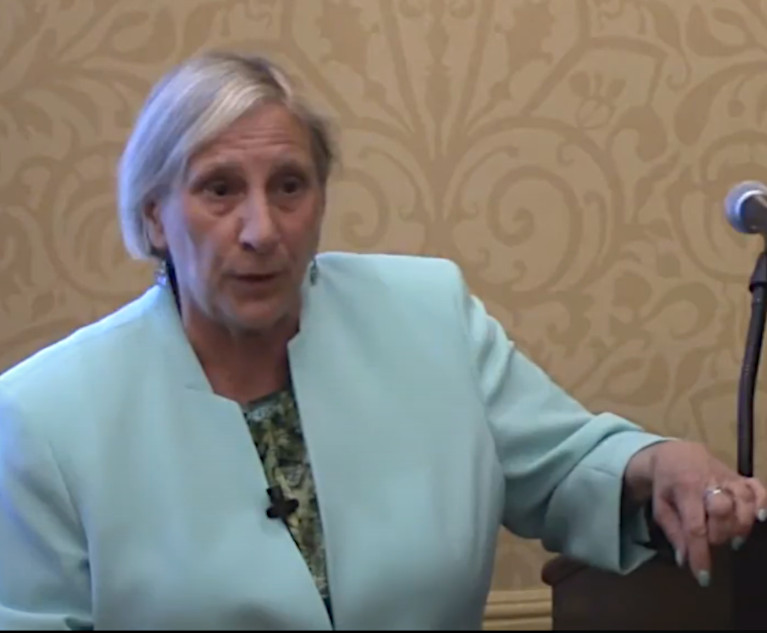Hong Kong Reacts as Beijing Plans Implementation of New National Security Law
Legal organizations and foreign business interests have raised concerns about Beijing's proposed legislation, and massive pro-democracy demonstrations are once again filling Hong Kong's streets.
May 25, 2020 at 11:49 AM
6 minute read
 Hong Kong protests, which were frequent in 2019, have resumed / Shutterstock.com
Hong Kong protests, which were frequent in 2019, have resumed / Shutterstock.com
The Chinese government's controversial plan to implement a national security law in Hong Kong has sparked reactions from Hong Kong's legal professional bodies and foreign companies, as massive pro-democracy demonstrations in the city resumed.
In a statement released Monday, the Hong Kong Bar Association (HKBA) expressed concerns about the draft legislation before China's National People's Congress, the country's legislature, that would clamp down on activities in Hong Kong in the name of national security, including "separatist, subversive, infiltrative, or destructive activities," as well as foreign interference in Hong Kong's internal affairs.
In particular, the HKBA questioned the legality of Beijing imposing the national security legislation on Hong Kong, arguing that Beijing does not have the power under the constitutional arrangement between the central government and the Hong Kong special administrative region to introduce the legislation without going through Hong Kong's Legislative Council, the city's only legislature under its mini-constitution, known as the Basic Law.
Hong Kong operates under a legal and political system separate from the rest of China. Under this "One Country, Two Systems" doctrine, new laws in Hong Kong are adopted through its own legislature. But Beijing has proposed that its new national security legislation be implemented in Hong Kong.
"There is no assurance that public consultation will take place at all on this vastly important legislation prior to promulgation. This is unprecedented," the HKBA said.
In addition, the HKBA questioned whether Chinese authorities have the legal right to enforce the new law. The Bar Association asked whether China's security agencies in Hong Kong will operate under and be bound by the laws of Hong Kong. Under the proposed law, the central government in China could install an enforcement body separate from that of Hong Kong's to enforce the new law. Chinese security agents currently don't have enforcement power in Hong Kong and the two jurisdictions do not have an extradition treaty.
The HKBA also expressed fears that the new law will have a negative impact on the independence of Hong Kong's judicial system due to "perceptions that the Judiciary of [Hong Kong] is being or will be instructed to act in a particular way."
The imminent arrival of national security legislation in Hong Kong comes after nearly a year of political unrest in the city that had led to violent clashes between the public and the police, injuries and deaths, and damage to public and private property. Yet Beijing's attempt to bypass Hong Kong's own legislative process in order to force through the controversial legislation fueled even more protests against the local and central governments over the weekend.
On Sunday, thousands of protesters rallied against the proposed national security legislation, with multiple rounds of tear gas fired by the police and more than 180 people arrested after violent clashes occurred again. Ten people were sent to the hospital, including a local lawyer, Chan Tze-chin, who is a partner at local firm Cheung & Liu Solicitors.
Chan was videotaped being beaten by a group of protesters and the Law Society of Hong Kong issued a strongly-worded statement on Monday following the attack.
"Inflicting bodily harm on others is a serious crime. The open defiance of law and order and the use of violence must be abhorred," the statement said.
Chan supported the Beijing-backed political reform package in 2015 as well as the controversial anti-mask law introduced in October banning the use of masks during protests, the South China Morning Post reported. The Law Society also condemned the circulation of personal details about the lawyer and his family online, a practice known as "doxxing," which has been used by both sides to target supporters of the opposing side.
The proposed national security legislation has raised concerns among foreign companies in Hong Kong about the future of the city as a viable place for business. The American Chamber of Commerce in Hong Kong has demanded to see more details regarding the new law and warned that it could lead to the United States rescinding the special trade privileges it affords Hong Kong if the city's autonomy is eroded as a result. The Chamber also raised concerns about the potential impact on foreigners living in Hong Kong, which could make it more difficult for companies to recruit and retain talent.
Hong Kong's status as a global business and financial hub is built on its credentials as a gateway into China's massive market with a strong rule of law and an independent judiciary that guarantees fair treatment for foreign investors. However, the city's ability to operate with a high degree of autonomy has come under growing scrutiny in recent years, culminating in last year's unprecedented political unrest after the government proposed to extradite individuals from Hong Kong to mainland China. In June, Hong Kong's legal community publicly joined a massive silent march in opposition to the bill.
The coronavirus outbreak beginning in January largely put the protests on hold, but they have gradually resumed in recent weeks as the virus has come under control. In April, two prominent lawyers, Martin Lee and Albert Ho, were among 15 pro-democracy figures arrested for their alleged roles in organizing last year's protests, which the HKBA criticized at the time as a move that "could be perceived as interference" by Beijing.
China has sought to calm fears, saying that the new national security law would not reduce the city's autonomy and only targets a "narrow category of activities that seriously jeopardize national security." Hong Kong's finance chief has also come out and said that the law will help the city's business environment rather than harm it.
"Violence and social unrest… have caused local and foreign investors to worry about Hong Kong's political and social stability risks. Therefore, it is necessary that there be legislation to plug Hong Kong's national security loopholes," he wrote in a blog post.
This content has been archived. It is available through our partners, LexisNexis® and Bloomberg Law.
To view this content, please continue to their sites.
Not a Lexis Subscriber?
Subscribe Now
Not a Bloomberg Law Subscriber?
Subscribe Now
NOT FOR REPRINT
© 2025 ALM Global, LLC, All Rights Reserved. Request academic re-use from www.copyright.com. All other uses, submit a request to [email protected]. For more information visit Asset & Logo Licensing.
You Might Like
View All
A Plan Is Brewing to Limit Big-Dollar Suits in Georgia—and Lawyers Have Mixed Feelings
10 minute read
HUD Charges Texas HOA With Housing Discrimination in Last Days of Biden Administration
5 minute read
Trending Stories
- 1Decision of the Day: Court Holds Accident with Post Driver Was 'Bizarre Occurrence,' Dismisses Action Brought Under Labor Law §240
- 2Judge Recommends Disbarment for Attorney Who Plotted to Hack Judge's Email, Phone
- 3Two Wilkinson Stekloff Associates Among Victims of DC Plane Crash
- 4Two More Victims Alleged in New Sean Combs Sex Trafficking Indictment
- 5Jackson Lewis Leaders Discuss Firm's Innovation Efforts, From Prompt-a-Thons to Gen AI Pilots
Who Got The Work
J. Brugh Lower of Gibbons has entered an appearance for industrial equipment supplier Devco Corporation in a pending trademark infringement lawsuit. The suit, accusing the defendant of selling knock-off Graco products, was filed Dec. 18 in New Jersey District Court by Rivkin Radler on behalf of Graco Inc. and Graco Minnesota. The case, assigned to U.S. District Judge Zahid N. Quraishi, is 3:24-cv-11294, Graco Inc. et al v. Devco Corporation.
Who Got The Work
Rebecca Maller-Stein and Kent A. Yalowitz of Arnold & Porter Kaye Scholer have entered their appearances for Hanaco Venture Capital and its executives, Lior Prosor and David Frankel, in a pending securities lawsuit. The action, filed on Dec. 24 in New York Southern District Court by Zell, Aron & Co. on behalf of Goldeneye Advisors, accuses the defendants of negligently and fraudulently managing the plaintiff's $1 million investment. The case, assigned to U.S. District Judge Vernon S. Broderick, is 1:24-cv-09918, Goldeneye Advisors, LLC v. Hanaco Venture Capital, Ltd. et al.
Who Got The Work
Attorneys from A&O Shearman has stepped in as defense counsel for Toronto-Dominion Bank and other defendants in a pending securities class action. The suit, filed Dec. 11 in New York Southern District Court by Bleichmar Fonti & Auld, accuses the defendants of concealing the bank's 'pervasive' deficiencies in regards to its compliance with the Bank Secrecy Act and the quality of its anti-money laundering controls. The case, assigned to U.S. District Judge Arun Subramanian, is 1:24-cv-09445, Gonzalez v. The Toronto-Dominion Bank et al.
Who Got The Work
Crown Castle International, a Pennsylvania company providing shared communications infrastructure, has turned to Luke D. Wolf of Gordon Rees Scully Mansukhani to fend off a pending breach-of-contract lawsuit. The court action, filed Nov. 25 in Michigan Eastern District Court by Hooper Hathaway PC on behalf of The Town Residences LLC, accuses Crown Castle of failing to transfer approximately $30,000 in utility payments from T-Mobile in breach of a roof-top lease and assignment agreement. The case, assigned to U.S. District Judge Susan K. Declercq, is 2:24-cv-13131, The Town Residences LLC v. T-Mobile US, Inc. et al.
Who Got The Work
Wilfred P. Coronato and Daniel M. Schwartz of McCarter & English have stepped in as defense counsel to Electrolux Home Products Inc. in a pending product liability lawsuit. The court action, filed Nov. 26 in New York Eastern District Court by Poulos Lopiccolo PC and Nagel Rice LLP on behalf of David Stern, alleges that the defendant's refrigerators’ drawers and shelving repeatedly break and fall apart within months after purchase. The case, assigned to U.S. District Judge Joan M. Azrack, is 2:24-cv-08204, Stern v. Electrolux Home Products, Inc.
Featured Firms
Law Offices of Gary Martin Hays & Associates, P.C.
(470) 294-1674
Law Offices of Mark E. Salomone
(857) 444-6468
Smith & Hassler
(713) 739-1250









